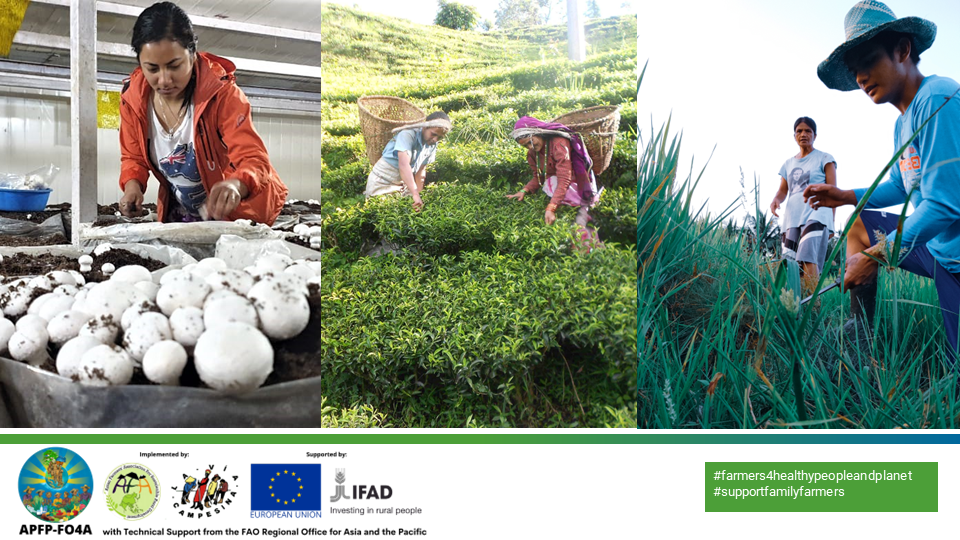Background
The recently held UN Food Systems Stocktaking Moment highlighted the enormous contribution of food systems transformation to solving many of the world’s sustainability challenges. Among them are biodiversity loss, ecosystem degradation, income inequality, malnutrition, and climate change, which are interrelated crises that are undermining progress made toward the 2030 Agenda and pose threats to the survival of future generations. Thus, throughout the global negotiation spaces and summits there’s an intensifying appeal for all actors to take bold, transformative actions in response to these multiple crises while we still can.
Small-scale family farmers have been producing significant amounts of diverse food for all people. And so they play an important role in i) transforming to sustainable, healthy, resilient , inclusive, empowering food systems, ii) conserving agrobiodiversity, iii) restoring soil health, (iv) ecosystem restoration and v) mitigating climate change. In 2017, the United Nations Framework Convention on Climate Change (UNFCCC) created a space – Koronivia Joint Work on Agriculture (KJWA) – to discuss the potential of agriculture to tackle climate change. This was then extended in COP27 (2022) under the space Joint Work on Implementation of Climate Action on Agriculture and Food Security. In the same year, the United Nations Decade of Family Farming 2019-2028 has been endorsed with the aim of placing family farming at the center of national public policies and investments. The Post-2020 Global Biodiversity Framework finalized in 2022 acknowledges the important roles and contributions of indigenous peoples and local communities as custodians of biodiversity and as partners in its conservation, restoration, and sustainable use[1].
Despite the fact that small-holder farmers hold a big part of the solutions, they are among the most vulnerable groups affected by climate change, energy crisis, environmental degradation, biodiversity loss among others. Therefore, farmers’ engagement in all related programs and projects on climate action and representation in decision-making processes at all levels must be ensured to take full advantage of the solutions in the hands of small-holder farmers and at the same time ensuring their current realities taken into account.
[1] Kunming-Montreal Global Biodiversity Framework
Objectives
The consultation aims to bring together diverse set of actors in the agriculture-fishery sectors to deliberate on key questions:
- What are the latest commitments and/or actions related to UNDFF, UNFSS, UNCBD, UNFCC/COP28 and land rights programs?
- UN Decade of Family Farming – National Action Plan on Family Farming or equivalent
- United Nations Framework Convention on Climate Change (UNFCCC) – Nationally Determined Contribution and National Adaptation Plans
- UN Food Systems Summit (UNFSS) – National Pathways to Sustainable Food Systems
- UN Convention on Biodiversity (UNCBD) – what are the national commitments
- In what ways can farmers organizations and other stakeholders engage and contribute to improving the implementation of action plans related to UNDFF, UNFSS, UNFCC , UNCBD and land related programs?
- How to create synergy among actors and among various initiatives?
- What are the mechanisms to ensure regular communication and coordination?
- How can farmers raise their voice in COP28?
- What are the key messages that can be emphasized in COP28?
- How to have representative of farmers join the official national delegation?
Participants
- FO representatives (NFO partners under APFP-FO4A; partners of ILC-NES, partners of FFF in the country, AMAN (Indonesia), FECOFUN (Nepal), etc.
- Government Representatives:
- National government agency in-charge of UNDFF or family farming concerns
- National designated authority (responsible agency for the national adaptation plan)
- National designated authority UNCBD processes
- National convenor/s of the National Pathways to Sustainable Food Systems (UNFSS)
- National government agency in-charge of implementation of land laws/VGGT
- Partner CSOs (academe/research institution/NGOs working on land rights, UNDFF, UNFSS/Food system, UNFCCC/Climate
Program
| AM Session | |
| 8:30 – 9:30 | Opening Program / Preliminaries |
| 9:30 -10:30 | Session 1: Updates on farmer-related programs with international commitment (15 minutes each)
• UNDFF • UNFSS • UNFCCC • UNCBD • Land/forestry/fishery What are the latest commitments and/or actions related to UNDFF, UNFSS, UNFCC/COP28 and land rights programs? |
| 10:45 – 11:30 | Session 2: Thematic Workshop
• Workshop group 1 National Action Plan and NCFF – priorities to advocate • Workshop group 2 National Pathways to Sustainable Food Systems • Workshop group 3 National Adaptation Plan • Workshop group 4 Land/Fisheries/forestry Program What are your key comments, observations/assessment (+ good points/-weak points/bottlenecks/challenges) related to the status of the implementation? What are your Key recommendations to address the bottlenecks/weaknesses/challenges) In what ways can farmers organizations and other stakeholders contribute to improving the implementation of action plans related to UNDFF, UNFSS, UNFCC and land related programs? |
| 11:30 -12:00 | Plenary reporting |
| 12:00 – 1:00 | Lunch |
| PM Session | |
| 1:30 – 3:00 | Session 3: Action points on building synergy
How to create synergy along various initiatives among government agencies and other stakeholders particulalry farmer organizations,? – What are the mechanisms to ensure regular communication and coordination? – How can farmer organizations regularly engage in the various processes (designing, implementation, monitoring & evaluation,etc) |
| 3:00 – 3:15 | Coffee/Tea Break |
| 3:15 – 4:45 | Session 4: COP28 Preparation – what is at stake at COP28 and Key actions of FOs (messages /demands and strategies)
– Briefer on COP 28 (pre-recorded presentation) – Proposed FO messages and action points (pre-recorded) What are your comments and suggestions on proposed FO messages? Will you organization be willing to be included in the signatory for the common statement? What are your comments and suggestions on the proposed actions? What can you contribute/commit to support the action points? |
| 4:45– 5:00 | Closing Program |




Comments are closed